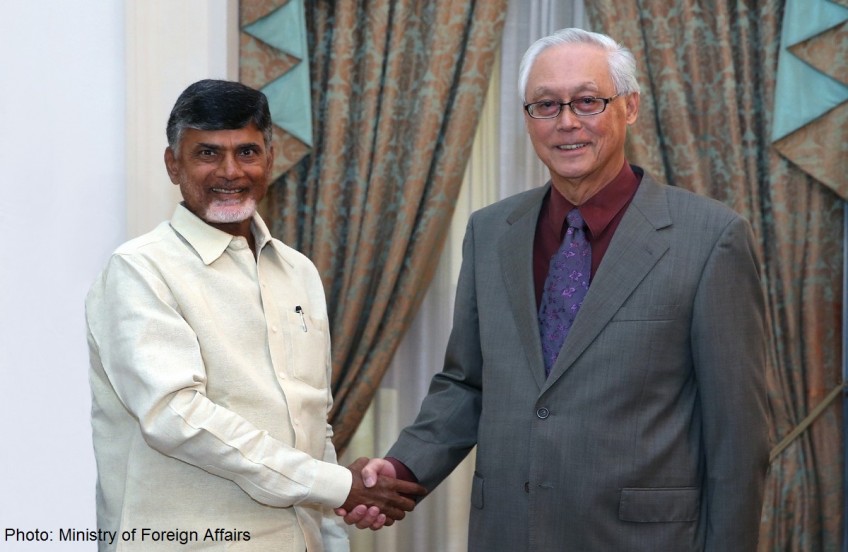Man to watch, so is his state

Indian politicians are known for making tall promises and painting a rosy picture of the future. Many of them visit Singapore and, from time to time, engage the business community, inviting them to invest in India.
India, no doubt, is an attractive business destination but not all the promises and predictions made by the politicians materialise.
Five years ago, Mr Kamal Nath, then India's minister for roads, transport and highways, visited Singapore. At a meeting organised by the Institute of South Asian Studies (ISAS) at Raffles Hotel he outlined his plans. He said his government would build 20km of roads every day. He wanted investment. Fast forward to today. India's Economic Times reports that the average length of national highways built per day between 2009-10 and 2013-14 was just under 8km. Mr Nath had not bargained for his plans to be hobbled by land acquisition issues, poor traffic growth as a result of a tame economy and pricier loans.
On Nov 14, another politician outlined his plans - for the state of Andhra Pradesh. The chief minister of the state N. Chandrababu Naidu made a detailed presentation at a business luncheon organised by the high commission of India in association with ISAS - which had organised a two-day international conference on the states of South Asia. Mr Naidu spoke for more than an hour with the help of powerpoint slides. The audience listened attentively. They knew the man talking to them was someone who could do what he promised. He had shown it before. He was no ordinary politician.
Mr Naidu had ruled as chief minister of undivided Andhra Pradesh from 1995 to 2004. Businessmen hailed him as a reformer. He brought in several multinational companies to Hyderabad, many of them top IT companies, and put the city on the global IT map. He was called the CEO of Cyberabad by many for the development he brought about to the state capital and the state.
But those in the rural areas of his state felt his policies did not reach them. In 2004, he and his Telugu Desam party were voted out of power. Now back in the saddle and with the state having been bifurcated, Mr Naidu has a lot to do. But, as he told the audience, he sees opportunity in such a situation. He also has some advantages, unlike Mr Kamal Nath. The Andhra CM is the head of his party and it has a majority in the state legislature.
The state needs a new capital which will be built on the banks of the river Krishna, in the Vijayawada region. His vision is to see Andhra Pradesh as one of the top three states in India by 2022.
For him, the road ahead consists of seven missions: Primary, urban, industry, infrastructure, services, skill development and social empowerment.
In his primary mission, he plans to make agriculture and allied activities profitable and sustainable and mitigate drought through water conservation. Remember, he was voted out in 2004 because many farmers had killed themselves as they were unable to pay back loans due to drought.
His urban development mission involves establishing three mega and 14 smart cities and improving transportation, housing and employment in urban areas. The industry mission intends to start a special economic zone, improve road connectivity, set up industrial corridors and enhance productivity in all sectors.
The infrastructure mission - one of his key focus areas - involves the setting up of ports, airports, gas grids and making the state a logistics hub.
The service sector is another area which he says holds great potential. He sees the development of several tourist spots and feels that this is one sector that can provide employment to a large number of people. He also hopes to provide broadband connectivity to all households in the state.
Acknowledging that the state has a young population, he wants to provide them with higher quality education and vocational education, boost entrepreneurship and foster better industry- academia collaboration. He also has on the anvil a slew of programmes like gender equality, poverty eradication and environmental sustainablity in his social empowerment vision.
Mr Naidu could well add a disaster prevention and recovery plan to his missions. On Oct 12, Visakhapatnam was devastated by cyclone Hudhud. On average, the state is either hit by a cyclone or falls victim to floods every few years.
During his three-day visit to Singapore, Mr Naidu met Emeritus Senior Minister Goh Chok Tong, Deputy Prime Minister Tharman Shanmugaratnam, Foreign Affairs and Law Minister K. Shanmugam and Minister in the Prime Minister's Office and Second Minister for Home Affairs and Trade and Industry S. Iswaran. He also met urban planning experts and experts from the National Water Agency, and the Public Utilities Board.
patrickj@sph.com.sg

Get a copy of tabla! for more stories.